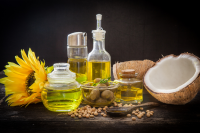Oil pulling is a controversial dental health practice that has recently gained popularity. Proponents claim that swishing oil in your mouth for a few minutes daily can improve oral health, whiten teeth, and even detoxify your body. However, some experts have raised concerns about the safety and effectiveness of oil pulling. In this blog post, we will explore the facts and fiction behind oil pulling and separate the myths from reality.
What is Oil Pulling?

An ancient Ayurvedic practice of oil pulling involves swishing oil in your mouth for 20 to 30 minutes before spitting it out. Coconut oil, sesame oil, and sunflower oil are the most commonly used oils for oil pulling. Proponents of oil pulling believe that the oil “pulls” toxins out of the body, improving oral and overall health.
To perform oil pulling, follow these easy steps: Place one tablespoon of oil in your mouth and swish it around for 10-20 minutes. Remember to spit the oil out into a trash can, not the sink, as it can obstruct the drain. Rinse your mouth with warm water afterwards. Many individuals prefer to do this in the morning before brushing their teeth.
-
Myth: Oil Pulling Can Cure Disease
One of the biggest myths surrounding oil pulling is that it can cure diseases. While some claim that oil pulling has helped them cure various ailments, no scientific evidence supports these claims. Oil pulling is not a substitute for medical treatment; you should not use it as a primary treatment for any disease.
Fact: Oil Pulling Can Improve Oral Health
While oil pulling may not be a cure-all, evidence suggests it can improve oral health. Studies have shown that oil pulling can reduce mouth bacteria, leading to improved oral hygiene and fresher breath. Additionally, some studies have shown that oil pulling can help reduce plaque and gingivitis.
-
Myth: Oil Pulling Can Whiten Teeth
Another common myth about oil pulling is that it can whiten teeth. While some claim that oil pulling has helped them achieve a brighter smile, no scientific evidence supports this claim. Some dentists have warned that oil pulling can damage tooth enamel and lead to tooth sensitivity.
Fact: Oil Pulling Is Safe When Done Correctly
When done correctly, oil pulling is generally safe. However, it is vital to use high-quality oil and to avoid swallowing the oil. Ingesting the oil can lead to an upset stomach or even diarrhea. Additionally, it would be best never to use oil pulling to substitute brushing and flossing.
-
Myth: Oil Pulling Can Detoxify the Body
Finally, another common myth about oil pulling is that it can detoxify the body. While oil pulling may help remove some toxins from the mouth, it is not an effective method for detoxifying the entire body. The liver and kidneys are responsible for detoxifying the body, and no evidence suggests that oil pulling can aid in this process.
Fact: Oil Pulling Can Improve Overall Wellness
Although oil pulling is not a detox method, it can still benefit your overall health. This ancient practice, which involves swishing oil in your mouth, can improve your oral health by decreasing your chances of developing gum disease, cavities, and other oral issues. Additionally, it may enhance your immunity by reducing the number of harmful bacteria in your mouth.
Benefits of Oil Pulling
While there is limited scientific research on the benefits of oil pulling, some proponents of the practice claim that it can help:
- Improve oral health: Oil pulling is to help remove bacteria and toxins from the mouth, which can improve oral health and hygiene. Some studies suggest that oil pulling can reduce the number of harmful bacteria in the mouth, which may reduce the risk of gum disease and tooth decay.
- Freshen breath: The antibacterial properties of oil-pulling oil may help freshen breath and reduce halitosis.
- Promote skin health: Some people claim that oil pulling can improve the appearance of their skin by reducing inflammation and promoting hydration.
- Boost overall health: Some proponents of oil pulling believe it can improve overall health by removing toxins from the body and improving digestion.
While some people may experience these benefits, it’s important to note that limited scientific evidence supports these claims. Practicing good oral hygiene habits, such as brushing twice a day, flossing, and visiting the dentist regularly, is essential to maintain optimal oral health.
Conclusion
Oil pulling is a controversial practice that has been praised by some and criticized by others. While there is some evidence to suggest that oil pulling can improve oral health, there is no scientific evidence to support many of the other claims made about this practice. Nevertheless, suppose you are interested in trying oil pulling. In that case, it is crucial to do so safely and to view it as a complementary practice rather than a substitute for traditional oral hygiene practices.